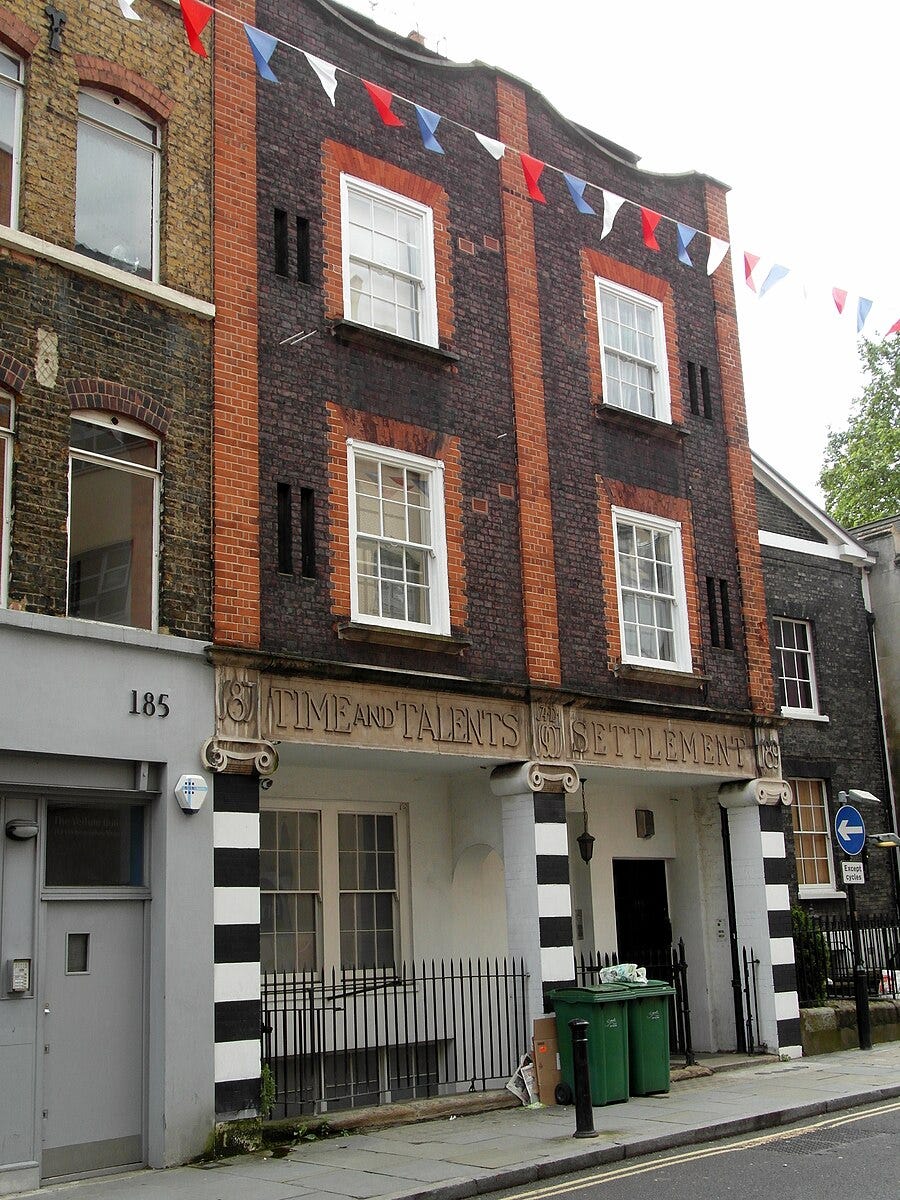Cuddle your grantmaker. (And not just for the money).
Being nice to grantmakers, charity sh*tshow updates, and what about endowments...?
This week: updates on the charity shitshow including a plea to be nice to grantmakers; NI debacles; and an extended piece about whether charity endowments could be a decent use of spend down funds. Plus swearing, madness, gin. Everything. PS: Seen something interesting you want to share? Send it to me on LinkedIn or via my website.
http://ww.alexevansconsulting.org
Sh*tshow update
It’s been interesting working with grant makers recently, and having wider conversations, seeing what is changing on their side. Let’s be really clear. They are more than aware how tough it is out there, and much as I still think it’s a lot harder to be a charity CEO trying to balance the books, I do know grants people are finding the overwhelm of applications stressful. Many have started to buy in additional assessment capacity, or collaborate with others to try to get through backlogs. Some trusts are indeed digging into their reserves/ endowments to meet some of the additional need. That does mean that in the future they may have less. But hey, rainy day funds are for rainy days and it is pissing it down. (Please excuse the preponderance of excretive metaphors in today’s post.) Others are sharing and collaborating more which allows them to spread risk - this is an approach that more and more funders are taking generally, especially to allow them to fund smaller groups who might be considered ‘higher risk’ (read: lower governance and turnover…).
Interestingly that was what I was suggesting a year ago when I was trying to get an emergency fund for charities on the brink constituted - I was working with a smaller funder to see if we could get some of the larger ones to agree a pooled fund to provide a cash injection of £50k for organisations with cash flow problems. 10k from 5 funders would barely scratch the sides of the risk register for most medium to large sized ones. No dice. Tbh they were right - perhaps they saw the iceberg was even bigger than was apparent to me then.
Meanwhile, while some are pausing, other grantmakers are often asking why they are doing that - and this is not only the smaller guys. In general it does seem that pausing has just stored up problems for everyone on both sides of the funder-fundee dyad. (Hereafter FFD.)
Note anyway that most are actually pausing for strategic reviews, including several of the grantmakers I’m working with those strategies at the moment (I know! They’re still talking to me!). So we are going to see a radically different funding landscape for charities and funders in the next year or so. Expect a bumpy ride, as some changes are looking to be very significant, and in some cases, fundamental. I’ll be looking at some of those as they are announced.
Incidentally, one half truth I am hearing is that trusts ‘have less money nowadays due to their investments not doing as well’ as one person told me recently. As far as I’ve heard, this is largely a myth - while some are a bit lower, many are doing fine, and some extremely well. Don’t forget that when the cost of living rises, lots of investments go up. Yes, our pensions go down, and your savings get less interest. But that is not the case for big money. That’s because they are the invested in the very things shafting you! Because capitalism….
Be kind to your grantmaker, they are often human
But let’s be clear, the most stressful thing about grant making is essentially the fact that you have to make ‘hard decisions that have real world impacts’ as the Trust for London grantmaker JD I saw this week said. And there are far more of those, more frequently, than there have been before. I’ve been talking to the grantmakers I currently work with, as well as those in the wider sector, and they say that staff - especially the younger ones who perhaps haven’t seen this before - are finding it hard. And no wonder.
In the past, when I’ve been working with staff directly, both in the grantmaking, and the care delivery side, my advice has always been that not making a decision is a decision. And that you can only make the best decision you can. Accepting you have the right - or even, just the responsibility - to make it, is a huge part of the difficulty. But acceptance is everything. If you don’t make the decision, you’re making one. Still now this is the advice I give people as a mentor.
Since I’m always arguing for better understanding and more collaboration, it’s important to note that everybody is feeling the pressure. As I’ve said many times - grantmakers, especially officers, really do care passionately about the charities they support. When they get the money they are punching the air. When the grants committee turns them down they are punching the wall. (Or the committee). People with power have to be challenged and questioned - but they too are doing their best in a bad situation.
Nonetheless, it’s also unhelpful to say ‘we’re all in this together’ as I’ve seen a few argue. You can’t ignore the differences. Grantmakers’ jobs are safe. And much as we/ they care, it is easily possible to insulate yourself from the direct human costs, although most try not to.
But funders too see and experience a failing system. The impacts of sector contraction are real across the spectrum - and that is most of all highly demoralising for us all. And there are many of them pretty demoralised, just as people on the delivery side are, even if the impacts will not be felt as keenly or immediately. They do care.
So please: if you see a grantmaker, pat them gently on the flank and say ‘gooood hoss’ and perhaps offer them a sugar lump. Everybody needs to know they are appreciated. One day I hope we can high-five each other with our respective hoofs, on either side of the FFD.
No idea where the horse metaphor came from there, but here’s a picture.
Freelance fundraisers are getting admirably bolshy
I notice meanwhile that grantmakers themselves are widely using Jo Jeffery’s list of closed charities and paused grantmakers. Can they give her some money please? Seriously guys, this is starting to feel a bit exploitative. This is putting the WTF in the FFD.
More generally though,
1) How many freelancers are there now? Empowerment and flexible working or gig economy? The massive increase in charity consultants could mean that the senior levels of support and experience are being stripped out of the sector - and without proper jobs to go round, they are having to take their chances as the charity executive equivalents of Deliveroo. That is not to say that many aren’t choosing it too - I, some years ago now, chose it because my health issues meant at that time that full time CEO was not viable. Many others are choosing it because they want to spend time with kids and family. And others are choosing it because it is fucking miserable being a small charity CEO.
But I do think it’s important to notice what is happening - it is saying something about the sector and its balance of skills that so many senior people are, I suspect not always choosing, the footloose and fancy free, and constantly ripped off, charity freelance brigade. There should be solid senior jobs to go around - but their dissolution as the sector contracts is not a good sign for the skills in the sector long term. Again, much as many people are choosing it for quality of life.
2) I think it’s fab how freelance fundraisers are turning out to be the noisy radicals in the VCS. More power to their elbow! It just goes to show, you never know where in a system the challenge will come from - this most disliked and underappreciated, publicly distrusted part of the sector is becoming its moral conscience. Fascinating…. And not at all surprising, because in some ways fundraising is often thankless - if you didn’t care about the causes, you just couldn’t do it.
Why I should have kept my gob shut about the budget
Meanwhile, of course, the whole NI thing has kicked off and I definitely spoke too soon last week. I can see there is a lot of concern which is reasonable, including the big letter thing from NCVO who I do think are doing a blinding job recently, and I had not realised then (many others were with me…) just how massive the impacts could be on medium-sized charities. Much as I’m still glad for small charities that the impact on many of them will be small, or even slightly positive. I still stand by the minimum wage thing, and I still have a real sense of unease when we are arguing as a sector against desperately needed taxation. Although of course it’s about where it falls.
This guy below, Richard J Murphy, is shouty but good. Much of what he says here is also true of small charities, and especially for founders. Although charities tend to keep going because of The Noble Cause no matter what. Whether we always should is debatable. But as the tax thing reminds us: we are essentially business owners.
A Think Piece: Why don’t we just endow charities?
LinkedIn stops people seeing things when I put links in them, so I wanted to reshare this. Someone recently said they like my ‘provocations’ - but they’re not really meant to be provocative. It’s just that asking if anything fundamental could change in the funding sector always seems to be provocative!
Except the one about children with cancer, that one was naughty and I know it upset a few people. Sorry. But you know, sometimes you have to poke a bit.
I’ve talked about the idea of re-endowing charities before, and, while I am under no illusions that it would help more than a relatively minor percentage, it does seem at least a more long termist use of funds for trusts who are spending down - or who should spend down! Pick a charity you care about and endow it. Community anchors especially - they’re the ones who sold up.
That’s one way to ensure a real legacy. It seems to me that there are so many creative ways some trusts could cease to exist, in ways that would have a much more lasting effect than just giving out more money for bouncy castles at church fetes1 and another leather armchair for the biggest cancer corporations, I mean charities. I should also point out that I am not an economist so you shouldn’t listen to me at all, but I still think I know more than any Tory in the country.
Several of the delivery side organisations I’ve been working with in the last year or so are having horrific issues with their venues and buildings. Often local authorities have stuck them with the bill for fixing dilapidated holes they pay rent on. How is this possible? I’ve been helping them try to think about how they make the argument to get a better deal - as well as some income that can help make it sustainable. But my point is that having property cuts both ways, of course.
Over the last 40 years, the public sector and charities have sold off most of their assets.
When I used to walk down Bermondsey street, which is now a posh, swanky hipster paradise in south central London, I used to see the name of my community anchor charity at the time in beautiful bold Victorian letters on the front of a nice sandstone building. It was one of many buildings it owned, bequeathed by various grand dames and benefactors. This one, now worth millions, had been flats since the 1980s and was now owned by a rich celebrity. When I had my civil partnership, it was in a horrible shitty registry office one step up from a portacabin. The previous registry office, a magnificent beaux arts grand edifice, was next door. It was now owned and occupied by a tech company.

The private, and the trusts and foundations sectors, kept their assets. This was what Gary Stevenson’s economics post (below) had me thinking the other day (unrelated to charities - he’s focused on public sector).
The UK public sector sold off the family silver - housing, hospitals, water, power, infrastructure over the course of the last 40 years. Now it’s pretty much permanently staving off bankruptcy. Charities too (especially place based ones who owned property - settlements and the like) divested and sold up to keep themselves afloat.
But trusts and foundations kept hold of their assets, and now still have cash to give, which nobody can deny is welcome, if imperfect in terms of power and distribution. If nothing else, it’s proof that selling off the family silver doesn’t help social care. If only our Governments had been as good at holding onto assets - and not just replacing them with rents and debts…. Essentially, for the public and some in the charity sector, we’re renting what we once owned.
So this makes me wonder again, as I’ve suggested in the past, whether one solution to the charity and foundation disjoint is actually to simply re-endow charities with assets. Moving endowments - or property - from many small funders to small local charities could save a lot of effort, and provide the stability that those local places need. Yes, it would mean making some permanent decisions. But since many are closing down anyway, why not do that? Weirdly I am seeing some go in the opposite direction: trusts starting up their own delivery, perhaps because they don’t trust charities to do it. Small charities, after all, are so… unstable….
Here’s Stevenson’s words:
“Back sort of 50 years ago, Western governments had a lot of wealth. We're talking about governments owning things like hospitals, like schools. But of course, in the case of the UK, the UK government did own also a significant amount of housing back in the ‘70s.
Governments have lost this wealth now. Not only do they not own wealth, they're actually in a significant amount of debt. What that means is if they want to provide you with the same level of service that they used to provide you with 30, 40, 50 years ago, they simply need more tax money because they no longer own the assets, and they need to pay rent or interest on those assets.
The reason that governments are having to charge much higher levels of tax to provide much worse levels of service is, quite simply, because governments are much, much poorer now. They need to rent everything they use, they need to pay interest, and that means they've taken that money from you. And despite taking more money from you, they can’t provide services. That is what happens when you go from being rich to being poor.”
- Gary Stevenson
https://youtube.com/shorts/_N39UWtPK9k?si=l7uhe3SnU7IYmQzp
Can I help your organisation?
If you’ve got this far you must be keen, so here’s a shameless self-plug.
There are a huge number of changes happening in the sector, and it’s hard to keep on top of them - and to plan for and navigate them even if you know what they are. If any of the issues here are things that are relevant to your organisation - Grantmaker, grant seeker, delivery charity, or anything inbetween - why not drop me a line to see if there’s any way I could help.
And to be clear - I don’t swear in person, and people say I am a delight.
I won’t hear a word said against bouncy castles though; although I did once lose my penknife on one as a boy, and the owner was not amused. Blimey. Remember penknives? Everyone talking about the modern day scourge of young people carrying knives, and there was I with a knife in my pocket from the age of about 7. For whittling and eating apples admittedly.






